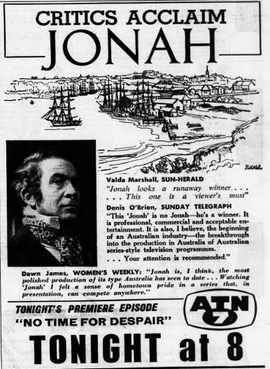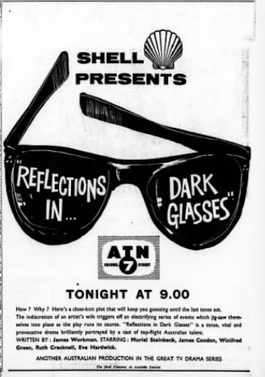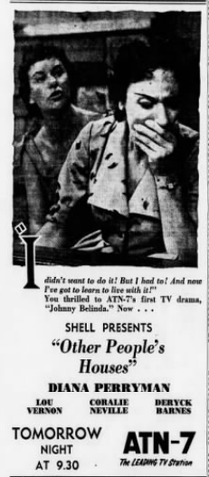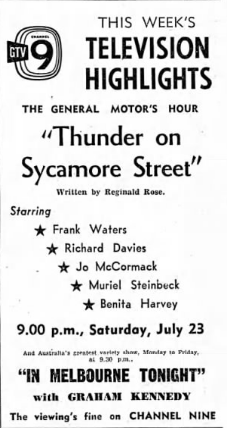Related Research Articles
Autumn Affair is an Australian television series made by and aired by Network Seven station ATN-7, and also shown in Melbourne on Nine Network station GTV-9. Television in Australia had only been broadcasting since 1956 and Seven was the first commercial station to make drama a priority. It premiered 24 October 1958 and continued until 1959. The series was the first ever Australian television soap opera. It was also the second regular Australian-produced dramatic television series of any kind, with previous locally produced drama consisting of religious series The House on the Corner, and one-off plays largely aired on ABC.
Emergency is an Australian television series produced by Nine Network Melbourne station GTV-9 in 1959.

Whiplash was a British/Australian television series in the Australian Western genre, produced by the Seven Network, ATV, and ITC Entertainment, and starring Peter Graves. Filmed in 1959-60, the series was first broadcast in the United Kingdom in September 1960, and in Australia in February 1961.

Jonah is an Australian television drama series which aired for 20 episodes starting from 15 October 1962 on the Seven Network. Produced during an era when commercial television in Australia produced few dramatic series, Jonah was a period drama, and was inspired by the success of ABC's period drama mini-series like Stormy Petrel.

Shell Presents was an early attempt at Australian television drama, being an umbrella title for several different productions. It debuted on 4 April 1959, and aired on ATN-7 and GTV-9, who split production of plays for the series between them. It was an anthology series, each program being a self-contained play for television. The series won a Logie award in 1960 for TV Highlight of 1959. As the title suggests, it was sponsored by Shell. It was described as "a very big deal for the station: major institutional sponsorship from international companies for locally produced drama." It would be followed by The General Motors Hour.

The Purple Jacaranda was an Australian television mini-series which aired on ABC in 1964 based on a novel by Nancy Graham. Cast included James Condon, Margo Lee, Ronald Morse, Diana Perryman, Walter Sullivan and John Unicomb.
This I Believe is an early Australian television program. Broadcast 5 nights a week on Sydney station ATN-7, it debuted 3 December 1956. It was a 15-minute program in which Eric Baume would provide a commentary on current world events. At the end of each TV program he would say "This I believe". The program ended around July 1958. According to television listings in the Sydney Morning Herald, the last few episodes of the program aired in an 11-minute time-slot.

"Reflections in Dark Glasses" is an Australian television film, or rather a television play, which aired in 1960. It aired as part of Shell Presents, which consisted of monthly presentations of stand-alone television dramas. It was written by Sydney writer James Workman, and is notable as an early example of Australian-written television drama. It was broadcast live in Sydney on 6 February 1960, then recorded and shown in Melbourne.

"They Were Big, They Were Blue, They Were Beautiful" is an Australian television movie, or rather a live television play, which aired live on 27 June 1959 in Sydney, and on 8 August 1959 in Melbourne. It aired as part of Shell Presents, a monthly presentation of standalone productions which aired from 1959 to 1960 on ATN-7 in Sydney and GTV-9 in Melbourne.

"The Big Day" is an Australian television film, or rather a live television play, which aired in 1959. The fifth episode of the Shell Presents presentations of standalone television dramas, it originally aired 11 July 1959 on Melbourne station GTV-9, a video-tape was made of the broadcast and shown on Sydney station ATN-7 on 25 July 1959.

"No Picnic Tomorrow" is an Australian television drama one-off which aired in 1960 on ATN-7 in Sydney and GTV-9 in Melbourne. Part of the Shell Presents series of one-off television dramas and comedies, it was produced in Melbourne, but first shown in Sydney on 9 January 1960, and on 23 January 1960 Melbourne.
The General Motors Hour was an Australian radio and television drama series.
"Johnny Belinda" was a 1959 Australian TV adaptation of the 1940 play by Elmer Harris which had been filmed in 1948. It was the first "live" one hour drama on commercial television in Australia.

"Pardon Miss Westcott" is a 1959 Australian TV play by the Seven Network as part of drama anthology series Shell Presents. It was a musical set in colonial Australia and was broadcast live. It was Australia's first television musical comedy. "Pardon Miss Westcott" aired on 12 December 1959 in Sydney and on 19 December 1959 in Melbourne.

"Other People's Houses" is the second episode of the 1959 Australian TV drama anthology Shell Presents. It was based on a play by Tad Mosel and starred Diana Perryman and was directed by David Cahill. It aired on 2 May 1959 in Sydney and on 3 October 1959 in Melbourne.

"Thunder of Silence" is an episode of the 1959 Australian TV drama anthology Shell Presents, and the fourth made in Sydney. It was based on an American play by Stewart Stern which had been produced in the U.S. with Paul Newman and Inger Stevens. It aired live on 22 August 1959 in Sydney with a recorded version airing on 28 November 1959 in Melbourne.

"A Tongue of Silver" is an episode of the 1959 Australian TV drama anthology Shell Presents. Australian TV drama was relatively rare at the time. It starred John Meillon, who had been in Thunder of Silence in the same series.

"Thunder on Sycamore Street" is a 1960 Australian television play directed by David Cahill. It was based on a script by Reginald Rose. It aired on 23 July 1960 in Melbourne and Sydney.
"The Grey Nurse Said Nothing" is a television play episode from the Australian television series The General Motors Hour. It was produced and directed by David Cahill. It was made by Channel Seven who later called "the most ambitious dramatic production ever attempted in Australia... [written by] one of the world's foremost authors of television plays and the cast is Ihe largest ever assembled for an Australian television dramatic production.... the greatest care has been taken to achieve the maximum possible standard in the production of the play which covered a total period of approximately eight weeks." The episode aired on 28 May 1960 in Sydney and Melbourne, and on 11 June 1960 in Brisbane.
"Shadow of a Pale Horse" is a television play that was produced for Australian TV by Sydney station ATN-7, it was also shown in Melbourne on station GTV-9, as this was prior to the creation of the Seven Network and Nine Network. "Shadow of a Pale Horse" aired on 17 September 1960 in Melbourne and Sydney.
References
- 1 2 "Search The Collection". National Film and Sound Archive . Retrieved 5 November 2023.
- ↑ "TV Ventures Bear Fruit, Report Finds". Radio/TV Supplement. The Age . 1 December 1960. p. 2. Retrieved 10 June 2013.
- ↑ Moran, Albert (1993). Moran's guide to Australian TV series: your complete guide to every drama series, children's show and sitcom. North Ryde, NSW: Australian Film Television & Radio School. p. 436. ISBN 978-0-642-18462-7.
- ↑ Bass, Don (28 July 1962). "Grey in black and white". The Bulletin . Vol. 84, no. 4302. John Haynes and J.F. Archibald. p. 34. Retrieved 23 March 2019.
- 1 2 "More local series to be made". TV Guide. The Sydney Morning Herald . 12 October 1959. p. 1. Retrieved 5 November 2023.
- ↑ "Channel Spots". The Sydney Morning Herald . 4 July 1960. p. 11. Retrieved 5 November 2023.
- ↑ "Australia's new serial near release". TV Guide. The Sydney Morning Herald . 28 August 1961. p. 1. Retrieved 5 November 2023.
- ↑ "ATN to provide shows in mid-morning". The Sydney Morning Herald . 9 October 1961. p. 10.
- ↑ ""Soap opera" comeback for wife with TV". The Age . 14 May 1964. p. 14. Retrieved 7 May 2013.